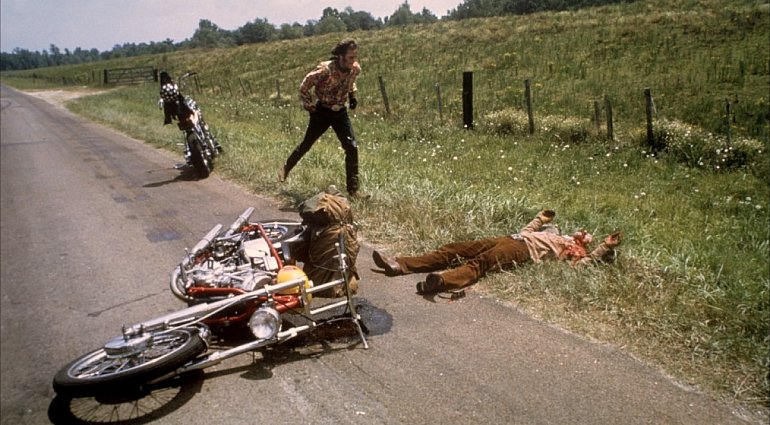
Seeing as this blog is named after the Carole King/Gerry Goffin penned Byrds song, "Wasn't born to follow", this blog will start off with a look at the film it's featured prominently, Easy Rider.
The film was sold with the tag "a man went looking for America, and couldn't find it anywhere" and is essentially a look at the unattainable American Dream, seeing through the eyes of the searching for answers Wyatt (played by Peter Fonda), and the paranoid, rambling Billy (played by Dennis Hopper). They've made a killing selling coke to a wealthy man, played by legendary "Wall of Sound" creator Phil Spector in what presumably is meant to be himself. Having scored the deal, they hit the open road, with Wyatt glancing at his watch then throwing it to the floor, where time is not an issue anymore.
The film, directed by Dennis Hopper, is heavy on symbolism that often seems too forced. When their bikes are in need of a tyre change, our favourite hippy duo seek refuge at a ranch. What follows is a scene where the changing of a tyre is juxtaposed against the image of the tyre change. The image suggests that the life of the open road, exploring the vast countryside, is the new cowboy way. This is reinforced when the duo, with the stranger on the highway, ride through Monument Valley, often the setting of many a classic John Ford film, as if to say "this is the new way of individualism".
And herein lies the point of the film. While people look at Wyatt and Billy as the quintessential hippies, on a hedonist trip of drugs and whorehouses, the ultimate point Hopper and co-writers Peter Fonda and Terry Southern are striving for is that with the advent of capitalism conformity, the role of the individual, the classic western character, is being lost. The character of George Hanson, memorably played by Jack Nicholson, relays the core message in a campfire scene with Billy. The trio have been ridiculed by local rednecks in a cafe, while at the same time sexualised by the women there. Billy, as ever, is angry this his long hair has caused such narrow mindness. George reminds him, it's not the hair that is the problem, but what it represents. Here, in square 1969, it represents the freedom to do what you feel, be an individual, and not be bought and sold in the marketplace, harking back to frontier ideals. George's speech on freedom still rings true today: if you dare to be different, it will scare those with power who liked to talk about freedom.
The film also, in my view a fact that is forgotten, takes a critical view of aspects of the hippy lifestyle. While setting off after departing the ranch, the duo pick up the stranger on the highway (to give him his credited name), who takes them to a commune he lives on. The commune is seeing some tough times, with their transport barely working and a danger the crops won't grow because the land is dry. The commune hosts a a number of wealthy dropouts, who appear to be ill at ease as the harsh realities of farm life. This offers a critical look at the commune lifestyle, overrun by people who have no clue as to what to do apart from drop out. Billy seems to want some of the free love that appears to be on offer in the commune, but his advances are not welcome, perhaps as the commune has grown tired of outsides. Later, the duo are taken to a lake not far from the commune to the strains of "Wasn't born to follow", one of the only times in the film Wyatt seems at easy with his surroundings. Wyatt is the more thoughtful of the two and seeks a spiritual awakening, who once states "I never wanted to be anyone else". Wyatt's ultimate quest is freedom, which are cruelly taken away from him in the films climax. Yet before this, Wyatt comes to believe that his and Billy's search of the American Dream is unfulfilled. Despite their financial prosperity, their bad trip in a Mardi Gras whorehouse and George's death at the hands of the rednecks leads his to conclude that their journey was a failure with the lines "We blew it".

Hopper, Fonda and Southern however declare in the films ending that because of the dying, they have actually achieved their dream of freedom. As stated in Roger McGuinn's "Ballad of Easy Rider that plays over the smoking bicycle,
"All he wanted was to be free, and that's the way it turned out to be..."
No comments:
Post a Comment